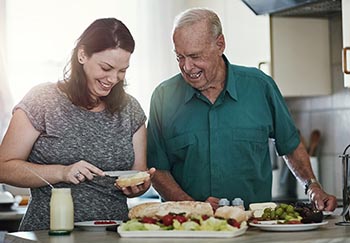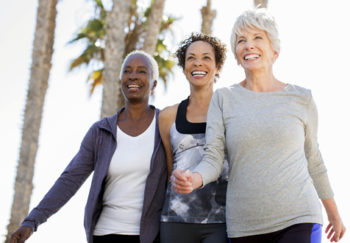
Roughly 100 million Americans travel over the holidays. If you’re one of them, you may be going to visit aging parents, grandparents or other family members, perhaps for the first time in months or even years. Amongst the holiday joy, this is an opportunity to consider the effects of aging and check up on your loved ones.
Geriatrician Seki Balogun, MBBS, points out that we all age differently. One person may still be doing quite well living on her own at age 90, while another needs nursing home care at 75.
Safety Concerns, Decreased Mobility? What to Look For
Pay attention to the person’s appearance, Balogun says. “Do they look as though they’re well-kept? Are they keeping up with their personal hygiene?”
Take note of any bruises, and observe gait. These issues could indicate a high risk of falling:
- Unsteady walking
- Holding onto things while walking
- Difficulty getting up from a chair — using arms, struggling
Wearing clothes that are too big could indicate a poor diet and unintentional weight loss. Look in the fridge — do you see a lot of fresh, healthy items — an indication of frequent grocery shopping — or very little food or expired food?
A dirty, unkempt home can also be a sign of health and mobility issues in the elderly. If your relatives allow it, look in the medicine cabinet. Discontinued and expired medicines or multiple bottles of the same thing are red flags, especially if they’re also confused about what they should be taking.
Elderly Drivers
The “everyone ages differently” mantra is true here, too. “I have some patients in their 90s who are doing quite well at driving, while there are some in their 70s who have no business driving,” Balogun says.
Recent accidents can be a sign of driving problems. Also, when riding with your relative, look for other warning signs like:
- Slow or no response to street signs
- Slower reaction times
- Driving too slow
- Getting lost in familiar places
Other Symptoms of Physical and Cognitive Changes
We’ve all misplaced our car keys or forgotten to do tasks. Some similar and mild memory issues are typical aging. But if your relative is forgetting your name or what she had for breakfast, that could be a symptom of early dementia or a sign of an underlying medical issue such as a urinary tract infection or diabetes, or it may be related to issues with medications. Also, observe changes in alertness.
Concerned About the Effects of Aging?
Don’t dismiss the value of an honest conversation. “Asking sometimes really is the only way to go,” Balogun says. Remind your loved one that you’re concerned and only want to help.
Worried About a Family Member?
Check out our national and Central Virginia aging resources.
If your loved one is having problems, it’s time for a trip to the doctor. If you can’t come along, consider calling the doctor in advance to share your concerns. While unable to share health information with you unless your relative consents, the doctor can listen to your concerns. Balogun points out that she can’t keep secrets, though — she does let her patients know that a concerned relative called.
Balogun really appreciates insight from relatives and friends who really know the patient.
“The insight of someone saying, ‘Well, I saw her last year and she wasn’t doing that but this year she is’ — that carries a lot of weight,” she says.

